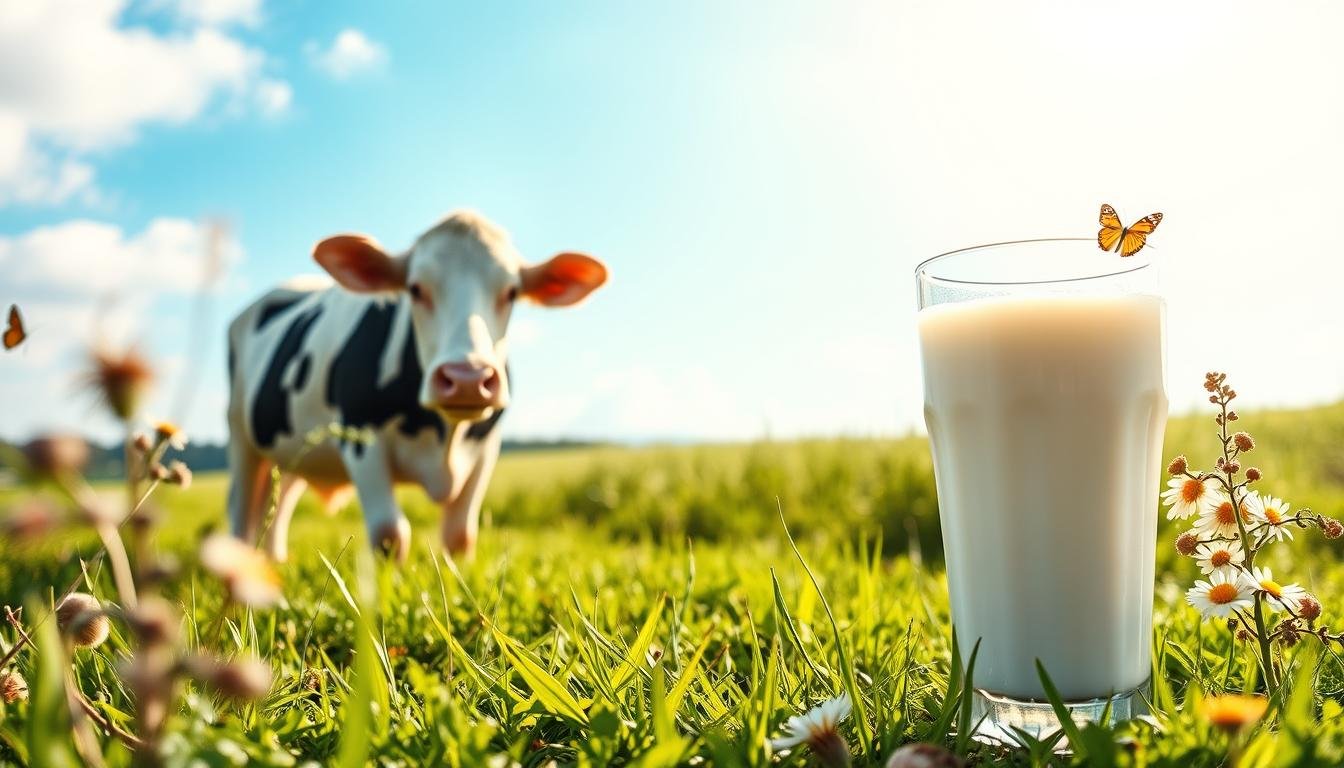Benefits of Drinking Organic Milk: you thought about switching to organic milk? It could really change your health and the planet. We’ll explore the amazing benefits of organic milk. You’ll see how it’s better than regular milk in many ways.
Did you know organic milk can make you healthier and help the planet? It’s different from regular milk in many good ways. Learning about organic milk can help you choose better for yourself and the Earth.
Benefits of Drinking Organic Milk Key Takeaways
- Organic milk is made with care for animals and the planet.
- It has more good stuff like omega-3s than regular milk.
- It’s free from bad stuff like synthetic hormones and antibiotics.
- Choosing organic milk helps the environment and is fair to animals.
- Many people like the taste and feel of organic milk better.
What is Organic Milk?
Organic milk comes from cows on certified organic farms. These farms follow strict rules to make milk in a green and fair way. Organic farming treats cows better, feeds them right, and is kinder to the earth.
Understanding Organic Dairy Farming
Organic dairy farmers care a lot about their cows. They let cows graze outside, so they can act naturally and eat fresh, organic food. These farms don’t use harmful chemicals or GMOs in the food they give to cows.
Regulations and Certification
To be called organic, dairy farms must pass a tough test. They follow rules from places like the USDA or the European Union. This makes sure the milk is clean, without bad stuff, and the cows eat well.
| Organic Milk | Regular Milk |
|---|---|
| Cows are fed organic, non-GMO feed | Cows may be fed conventional, potentially GMO-based feed |
| No synthetic fertilizers or pesticides used on the farm | Synthetic fertilizers and pesticides may be used |
| Cows have access to pasture and can express their natural behaviors | Cows may be confined indoors and have limited access to pasture |
| No antibiotics or growth hormones used | Antibiotics and growth hormones may be used |
Knowing about organic dairy farming helps us choose better milk. It’s all about caring for cows and the earth.
Benefits of drinking organic milk
Drinking organic milk has many good points. It’s made with strict rules for quality and safety. It also helps the planet and animals.
Organic milk is better for your health. It doesn’t have bad stuff like synthetic hormones or GMOs. This makes it safer and more nutritious.
- It has lots of vitamins and minerals like calcium and vitamin D. These are good for your bones and brain.
- It has more omega-3 fatty acids. These are good for your heart and brain.
- Organic farms treat cows well. They let them eat grass without pesticides.
Organic milk is also good for the Earth. Farms use less fuel and fewer chemicals. They also help keep the planet green.
“Organic milk is not just a healthier choice for individuals, but it’s also a more sustainable and responsible option for the planet as a whole.”
In short, organic milk is great for you and the planet. It’s healthier, better quality, and eco-friendly. Choosing organic milk helps you and the Earth.
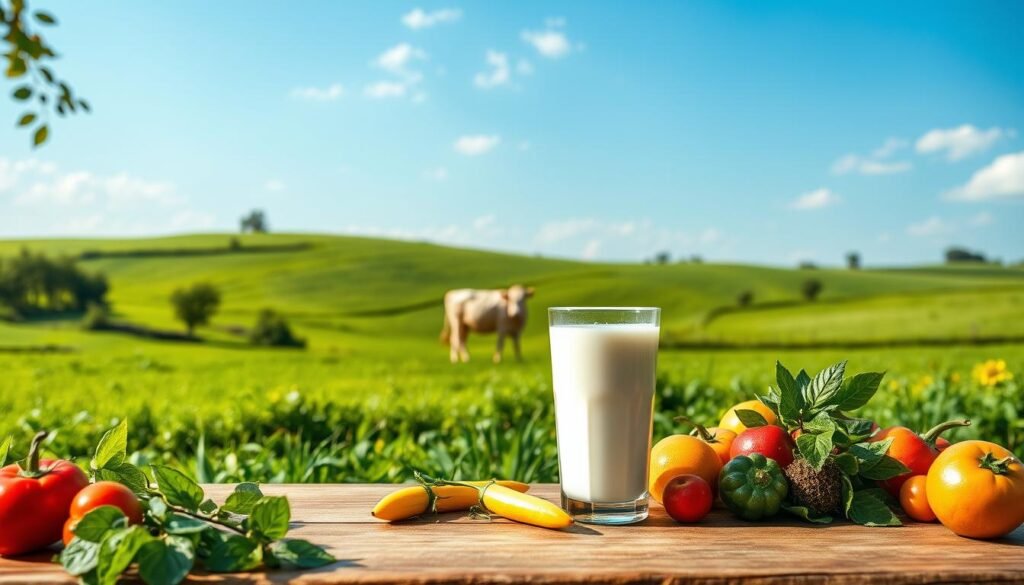
Nutritional Advantages of Organic Milk
Organic milk is better for your health than regular milk. It has more nutrients that are good for you.
Higher Omega-3 Content
Organic milk has more omega-3s than regular milk. Cows that eat organic food make milk with more omega-3s. Omega-3s help your heart and brain stay healthy.
Hormone and Antibiotic-Free
Organic, hormone-free milk and antibiotic-free milk don’t have bad stuff in them. This means you won’t get sick from drinking it.
“Drinking organic milk is a simple way to reduce your exposure to synthetic hormones and antibiotics, while also benefiting from the higher nutritional content.”
Choosing organic milk means you get milk without bad stuff. It’s better for your family’s health.
Environmental Benefits of Organic Dairy Farming
Organic dairy farming is good for the planet. It makes the dairy industry and communities healthier. These methods help our planet and support the dairy industry.
Sustainable Practices
Organic dairy farmers use green practices. They avoid harmful chemicals and use natural fertilizers. They also focus on keeping the ecosystem healthy.
These farmers use renewable energy. They work to make the soil better and protect animals. This helps reduce harmful gases in the air.
Reduced Environmental Impact
Organic dairy farming is better for the environment. It makes less pollution and uses less water. It also makes less waste.
This way of farming is good for our planet. It meets the needs of people who want sustainable food.
“Organic dairy farming is a holistic approach that prioritizes environmental stewardship and animal welfare, delivering benefits that resonate throughout the entire supply chain.” – Dr. Sarah Greenfield, Sustainable Agriculture Researcher
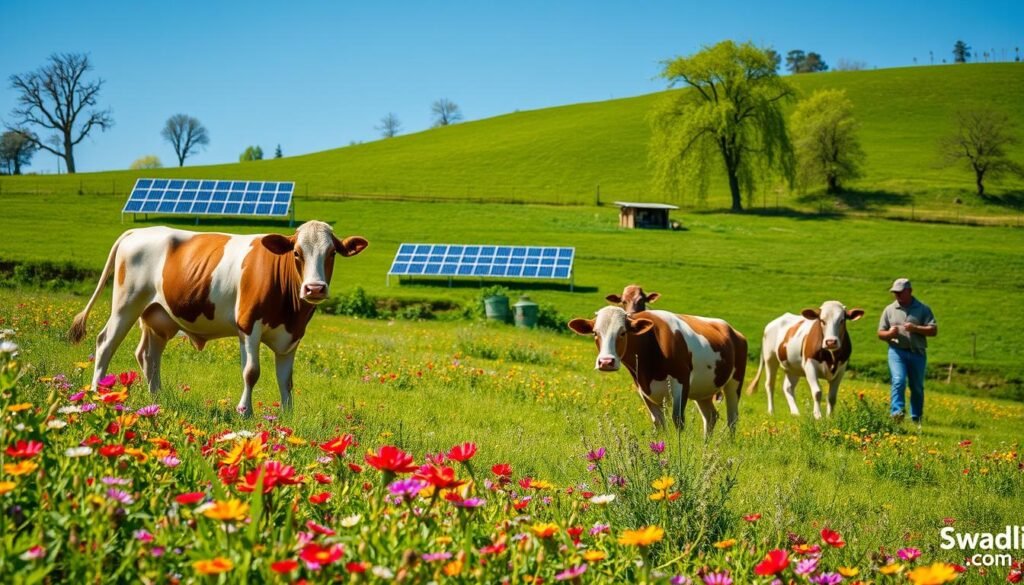
Organic dairy farming helps our planet. It meets the demand for sustainable dairy products. This makes the dairy industry stronger and supports a greener food system.
Organic Milk and Cow Welfare
Organic dairy farming puts cow welfare first. Organic certification means cows get to graze and eat without growth hormones or antibiotics.
Organic dairy farmers care a lot about their cows. They know happy cows make better milk. This makes the milk better for us.
- Pasture-Raised Cows: Organic cows get to roam in big pastures. This makes them happy and healthy.
- Antibiotic-Free Diets: Organic cows don’t get growth hormones or antibiotics. This keeps their milk pure and good for us.
- Humane Handling: Farmers treat their cows gently. They make sure cows are happy and respected.
Organic dairy farming is all about treating cows right. This shows the organic movement’s values. It makes organic milk a good choice for us.
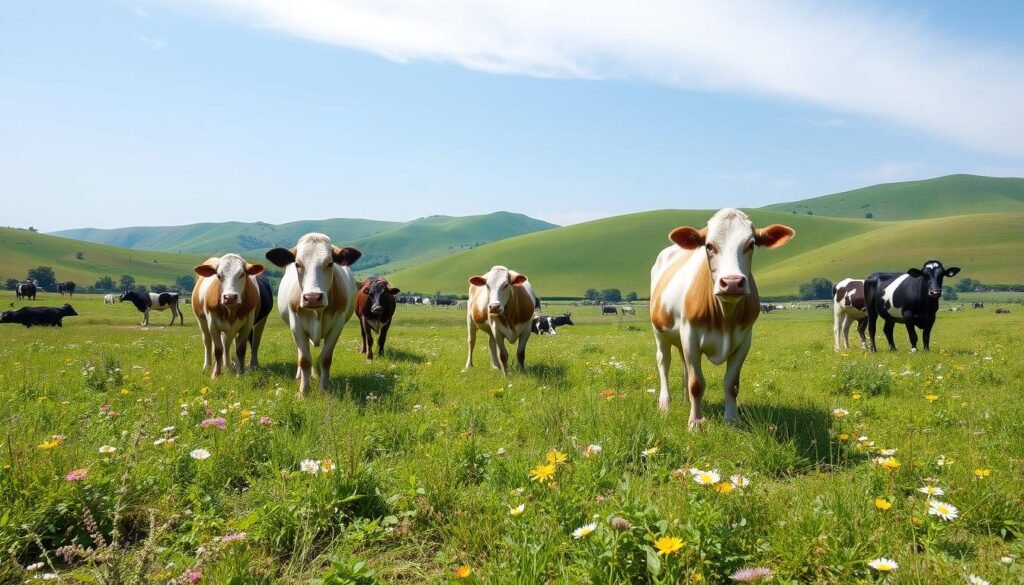
“Organic farming is not just about the end product – it’s about the entire process, including the well-being of the animals that are an integral part of the system.”
Taste Comparison: Organic vs. Regular Milk
Many people say organic milk tastes different from regular milk. This is because of how organic milk is made. Organic farming methods give it a special taste and feel.
Flavor Profiles and Texture
Organic milk feels creamier and tastes richer. This is because organic cows eat grass. Their milk has more fat, making it taste sweeter and fresher.
| Attribute | Organic Milk | Regular Milk |
|---|---|---|
| Flavor Profile | Creamier, richer, with subtle notes of sweetness | More “processed” taste, less pronounced flavors |
| Texture | Thicker, creamier mouthfeel | Thinner, less creamy texture |
Organic milk tastes better in baking, coffee, and as a drink. It’s richer and more flavorful. Many people prefer it for these reasons.
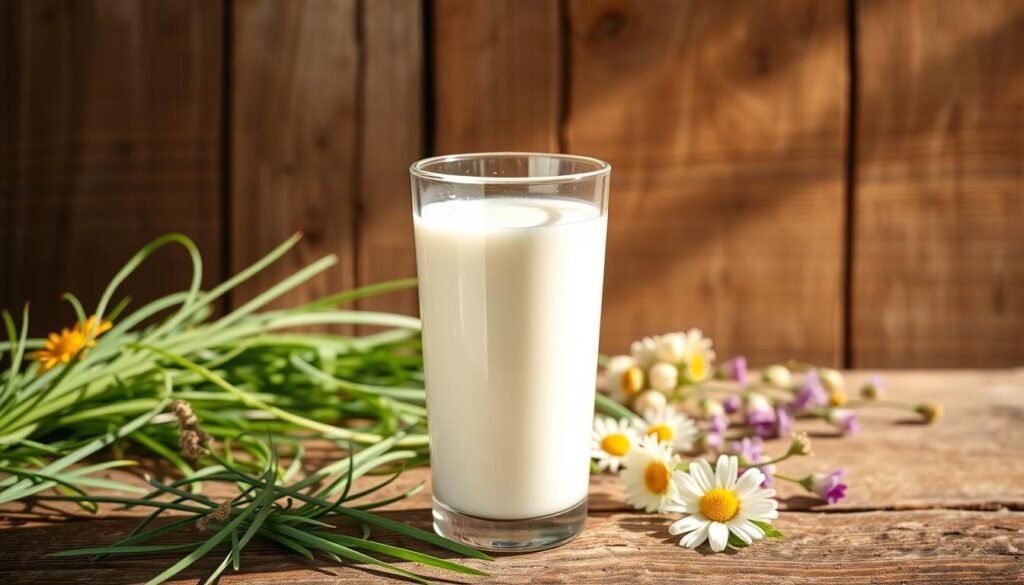
“The creaminess and natural sweetness of organic milk really elevates the flavor of my baked goods. I’ll never go back to regular milk after experiencing the taste difference.”
Choosing between organic and regular milk depends on what you like. But if you want a richer taste, organic milk is a great choice.
Cost Analysis: Is Organic Milk Worth It?
Organic milk is popular, but it costs more. Many wonder if it’s worth the extra money. We’ll look into this to see if organic milk is a good buy.
Organic milk costs about $4.50 per gallon. Conventional milk is around $3.25 per gallon. The main reason for this difference is the higher costs of organic farming.
| Milk Type | Average Retail Price (per gallon) |
|---|---|
| Organic Milk | $4.50 |
| Conventional Milk | $3.25 |
Organic farmers follow strict rules. They use non-GMO feed and no synthetic stuff. They also care for the animals more. These rules make organic milk more expensive. But, many think it’s worth it because of its better health and environmental benefits.
“The price of organic milk may be higher, but the long-term health and environmental benefits make it a worthwhile investment for many consumers.”
When deciding, think about what matters to you. Consider how much milk you use, your diet, and if you care about the environment. These things help decide if organic milk is right for you.
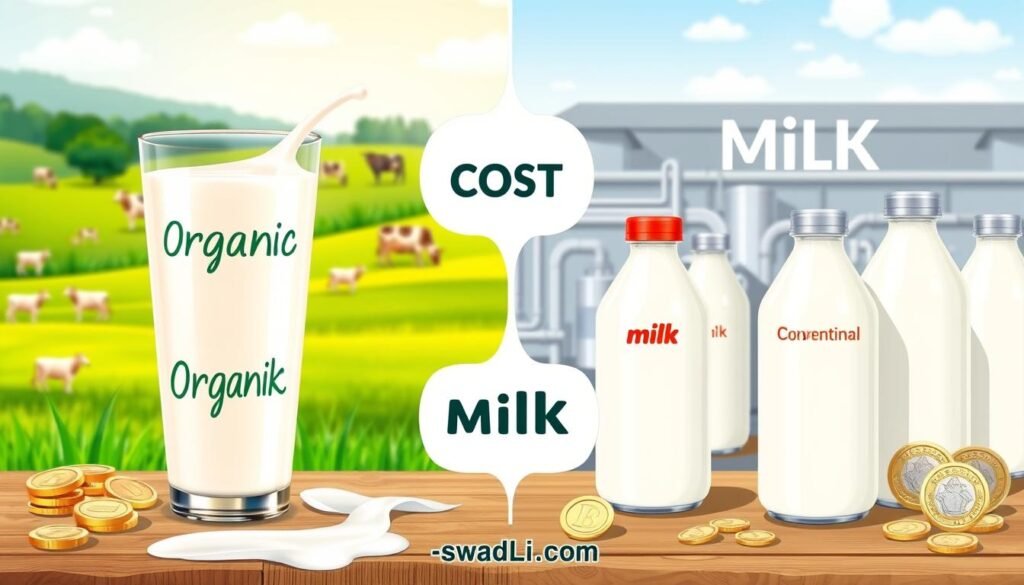
Health Benefits of Organic Milk
Organic milk is good for you in many ways. It tastes great and is full of nutrients. These nutrients can make you feel better.
Potential Allergy Prevention
Organic milk might help prevent milk allergies. Kids who drink organic milk are less likely to get milk allergies. This is because organic milk doesn’t have bad stuff like synthetic hormones or GMOs.
Nutrient-Rich and GMO-Free
Organic milk is packed with good stuff like vitamins and minerals. It has lots of vitamin A, vitamin D, calcium, and phosphorus. Plus, it doesn’t have GMOs, so it’s pure and safe for your family.
| Nutrient | Organic Milk | Conventional Milk |
|---|---|---|
| Omega-3 Fatty Acids | Higher Content | Lower Content |
| Antioxidants | Higher Content | Lower Content |
| Vitamins A and E | Higher Content | Lower Content |
Choosing organic milk means you get a healthy, GMO-free choice. It’s good for your family’s health and might prevent milk allergies.
Organic Milk Production Process
The making of organic milk is a detailed process. It focuses on farming that’s good for the earth and the cows. The goal is to keep the milk pure and full of nutrients.
Pasture-raised cows are at the center of this process. They roam freely on organic fields. There, they eat many kinds of grasses and plants. This diet, without bad chemicals, makes the milk healthy and full of good stuff.
Organic farmers also make sure their cows eat non-GMO food. This means no genetically modified stuff in their feed. It keeps the milk’s quality and nutrients safe.
| Organic Milk Production Practices | Benefits |
|---|---|
| Pasture-raised cows | Cows can naturally graze on organic pastures, resulting in nutrient-rich milk |
| Non-GMO feed | Ensures the milk is free from genetically modified organisms |
| Absence of synthetic hormones and antibiotics | Produces milk that is free from harmful additives |
Following these organic farming ways, milk makers can offer top-quality milk. This milk is good for you and tastes great.

Organic Milk and Sustainable Farming
Organic milk is good for more than just our health. It also helps the planet. This is because organic farms use special ways to farm. They let cows eat grass and feed them special food.
Pasture-Raised Cows
Organic farms let cows eat grass. This makes them happy and healthy. But, regular farms keep cows inside. This is not as good for them.
Non-GMO Feed
Organic farms give cows special food. This food is made without bad stuff. It’s better for the cows and the earth.
Organic farms are good for the earth. They make milk that is healthy for us. And they help the planet too.
| Organic Dairy Practices | Conventional Dairy Practices |
|---|---|
| Pasture-raised cows with access to open spaces | Confined cows in indoor facilities |
| Non-GMO, organic feed | GMO-based feed |
| Reduced use of synthetic pesticides and fertilizers | Reliance on synthetic inputs |
| Promotion of biodiversity and ecosystem health | Potential for environmental contamination |
Organic farms are better for cows and the earth. By picking organic milk, we help the earth. We also make sure cows are treated well.
Choosing the Right Organic Milk for Your Needs
Choosing the right organic milk can be tricky. There are many organic dairy products out there. Knowing the differences helps you pick the best for your family.
Fat Content Considerations
Organic milk has different fat levels. Think about what you need and like. Low-fat milk is good for calorie watchers. Whole milk is creamier and has more nutrients.
Processing Methods
Look at how the milk is processed. Some organic milk keeps more natural goodness. Others might be homogenized or pasteurized. Check the labels to see how yours is made.
Organic Certifications
Make sure your milk has the USDA Organic seal. This means it comes from cows raised on organic farms. They eat organic food and live in a clean environment.
| Organic Milk Attribute | Benefit |
|---|---|
| Hormone and Antibiotic-Free | Supports overall animal welfare and human health |
| Sustainable Farming Practices | Reduces the environmental impact of dairy production |
| Higher Omega-3 Content | Provides essential fatty acids for cardiovascular and brain health |
Think about these points to pick the best organic milk for your family. It’s good for your health and the planet. Quality organic dairy offers many benefits.
Choosing organic milk has many benefits. It has more omega-3s and no hormones or antibiotics. This makes it a healthier choice than regular milk.
Organic milk also helps the planet. It supports farms that care for the earth and animals. This makes dairy better for everyone.
Read More Like This: Click here
Read This Also: Health Benefits of Eating Ice Cream
When you pick organic milk, you help animals and the planet. You also get better-tasting milk. This choice is good for now and the future.
Benefits of Drinking Organic Milk FAQ
What is organic milk?
Organic milk comes from cows on organic farms. These farms follow strict rules. They make sure cows eat no synthetic stuff.
They also don’t use hormones or antibiotics. This makes the milk safe and healthy.
What are the benefits of drinking organic milk?
Organic milk is better for you. It has more nutrients and is safer. It’s also better for the planet.
It has more omega-3s, vitamin E, and beta-carotene. Plus, it’s free from bad stuff. Organic farming is good for animals too.
How does organic milk differ from regular milk in terms of nutrition?
Organic milk has more omega-3s. It’s also better in omega-3 to omega-6 ratio. It has no synthetic hormones or antibiotics.
What are the environmental benefits of organic dairy farming?
Organic farming is better for the earth. It uses natural ways to keep soil good. It also helps animals and cuts down on bad gases.
It avoids harmful chemicals. This is good for our planet.
How does organic milk production ensure animal welfare?
Organic farms give cows good food and places to roam. They don’t use bad hormones or antibiotics. This keeps cows healthy and happy.
How does the taste of organic milk differ from conventional milk?
Organic milk tastes richer and sweeter. This is because cows eat better. It also doesn’t get changed like regular milk.
Is organic milk more expensive than regular milk?
Yes, organic milk costs more. But many think it’s worth it. It’s healthier and better for the earth.

